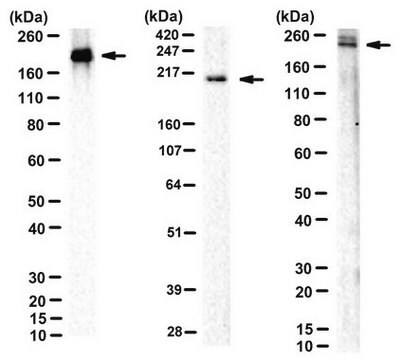MABS1246
Anti-BIG2 Antibody, clone 56
clone 56, from mouse
Synonym(s):
Brefeldin A-inhibited GEP 2, ADP-ribosylation factor guanine nucleotide-exchange factor 2
About This Item
Recommended Products
biological source
mouse
Quality Level
antibody form
purified antibody
antibody product type
primary antibodies
clone
56, monoclonal
species reactivity
human
technique(s)
immunocytochemistry: suitable
immunoprecipitation (IP): suitable
western blot: suitable
isotype
IgG1κ
NCBI accession no.
UniProt accession no.
shipped in
ambient
target post-translational modification
unmodified
Gene Information
human ... ARFGEF2(10564)
General description
Specificity
Immunogen
Application
Signaling
Immunoprecipitation Analysis: A representative lot detected BIG2 in Immunoprecipitation applications (Lowery, J., et. al. (2013). J Biol Chem. 288(16):11532-45).
Immunocytochemistry Analysis: A representative lot detected BIG2 in Immunocytochemistry applications (Lowery, J., et. al. (2013). J Biol Chem. 288(16):11532-45).
Western Blotting Analysis: A representative lot detected BIG2 in Western Blotting applications (Lowery, J., et. al. (2013). J Biol Chem. 288(16):11532-45).
Quality
Western Blotting Analysis: 2 µg/mL of this antibody detected BIG2 in 10 µg of human brain tissue lysates.
Target description
Physical form
Storage and Stability
Other Notes
Disclaimer
Not finding the right product?
Try our Product Selector Tool.
Storage Class Code
12 - Non Combustible Liquids
WGK
WGK 1
Certificates of Analysis (COA)
Search for Certificates of Analysis (COA) by entering the products Lot/Batch Number. Lot and Batch Numbers can be found on a product’s label following the words ‘Lot’ or ‘Batch’.
Already Own This Product?
Find documentation for the products that you have recently purchased in the Document Library.
Our team of scientists has experience in all areas of research including Life Science, Material Science, Chemical Synthesis, Chromatography, Analytical and many others.
Contact Technical Service








